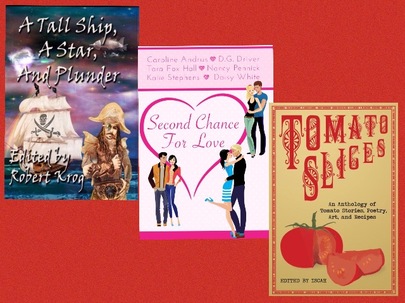 I have excerpts from my stories and buy links for these books on my website. Click and take a look. I have excerpts from my stories and buy links for these books on my website. Click and take a look. Short stories occupy most of my thoughts these days. Earlier this year my short story “The Ticket to Her Heart” was published in the romance anthology Second Chance for Love. In two weeks my fairy tale “The Tomato Quest” will be published in an anthology of stories, articles, and recipes called Tomato Slices. I have joined a fun group of indie fantasy authors called Fellowship of Fantasy, and they are putting together an anthology of fantasy stories around the theme of mythical creatures. I’ve spent the past two weeks writing a short story for possible inclusion in that book. It has to go through a judging process, so it’s not a guarantee. I have my fingers crossed, though. On top of all of that, if you read my last post, I’ve been still trying to figure out how to get people to read my stand-alone novella Passing Notes and wondering if I should write more stories to go with it and make it an anthology. In June I was asked to speak on a panel about short fiction at Hypericon, a convention for speculative fiction. It was a lot of fun to share the microphone with other fantasy/scifi writers who are published in short fiction and talk about the nature of short fiction and why we like to write it. I believe that short stories, whether 2,000 words or 15,000 are more direct than novels. They usually center around one character and one moment in time (or a very short time period) with no subplots. They are sometimes abstract, but they do follow an arc from beginning to end. If there is no end, it is a scene not a story. 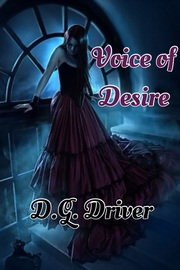 Click on this picture and scroll on down to find links to all my Wattpad fairy tales. Click on this picture and scroll on down to find links to all my Wattpad fairy tales. I’ll be honest, I consider myself a novelist, and short stories are difficult for me to write. I’m just too wordy and tend to overwrite. In my college writing class I always wrote a minimum of 15 page stories when we were asked to keep them around eight. One of my stories was 32 pages, and I didn’t even turn it in. I just started over with something new. (That long story, btw, was the first of my romantic fairy tales “Voice of Desire” which I have up at Wattpad.) When I first began writing, I wrote short stories for fun. An idea would come to me and I’d jot it down. I wrote a lot of songs and poems back then too. My writing career began with getting short stories published in magazines like Children’s Digest, Ladybug, Story Friends, Funny Times, and I had two in Chicken Soup for the Soul books among other places. I eventually started selling books and now I don’t work on short stories unless I come across a specific call for them from a publisher or contest. I really do like the challenge of writing to a theme and deadline. Sometimes the stories work and sell, and sometimes they get put in my “I’ll come back to that someday” file on my computer. 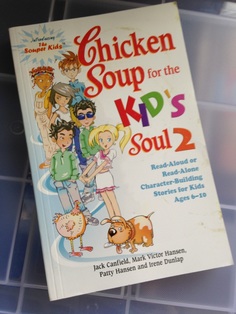 I recently read a blog post by another author about how she makes more money with her short stories than with her novels. She didn’t say why, unfortunately, and I would have loved that information. I have not seen much income from short stories. My biggest paychecks were from the Chicken Soup books, but in a lot of cases I was rewarded with free copies or $20. I have a few stories in books that pay royalties, but I have my doubts that I’ll ever see a dime from that as the money has to be split between all the authors (one of the books has 25 authors). And, frankly, I don’t see the short story collections winging their way off to Kindles on a regular basis. So, why write short stories? What’s the point? What do authors get out of it? Why do publishers bother with them? What are we all trying to achieve here? To answer this, I interviewed several published authors of short stories and the editors of three of the collections featuring my stories. I got so much wonderful stuff from them it won’t all fit in one blog post. So, I’m breaking it up into two parts. Today, I will include some thoughts from the author perspective and next week I’ll feature the editing side of things. 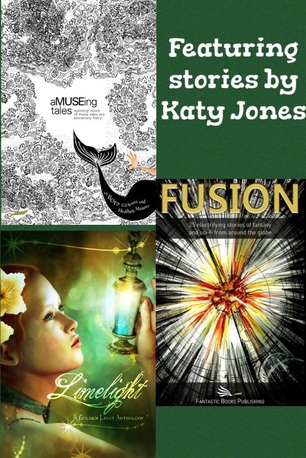 Click here to get to the Amazon page for Katy Jones and find all these gorgeous books. Click here to get to the Amazon page for Katy Jones and find all these gorgeous books. Katy Jones has had 13 short stories published over the years. She writes primarily children’s and fantasy. Her story “Tam and the Giantess” won first place in an international competition and was printed in a collection called Fusion, and she has stories in the anthologies aMUSEing and Limelight. She says she used to write more short stories, but now prefers novels. “The stories I want to tell take too many words!” When she does write she crafts them “only if I have a clear I idea of the characters and the single story I want to tell.” She believes that “there is an art to writing short stories, which is quite different than writing a novella or a novel. When I first began 30 years ago, I tried to cram too much into each story.” Why does she like writing short stories? “The satisfaction of completing a project and seeing it in print, it's validation as a writer. And the extra money doesn't hurt, especially if the story is picked up by another market and you get check(s) for reprints.” Which prompted to me to ask if she found selling short stories to be profitable for her. “Not as much as it used to be when more people read magazines,” Jones confessed. “The story I've made the most for was one about a Navajo girl in Highlights for Children because it had so many reprints. ($250 when I first sold it and about $2,000 in reprint royalties).” 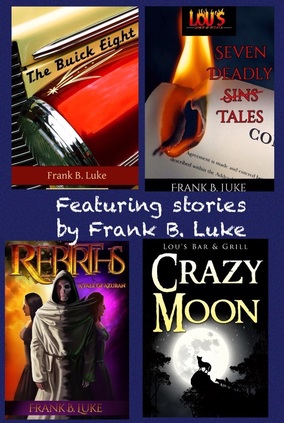 Click on this picture to find Frank B. Luke's story collections on Amazon. Two of them are FREE. Click on this picture to find Frank B. Luke's story collections on Amazon. Two of them are FREE. Frank Luke writes supernatural fiction and has had 12 stories published. “The Other Cemetery” appears in Supernatural Colorado. His three Shylocke Avery stories were in the Cross and Cosmos Year 1 Anthology. “The Strong Survive” appeared in the Cross and the Cosmos e-zine. Then he self-published “The Buick Eight” to Amazon. It's the first part of the Joshua's Pawn Shop series. The companion set of short stories, Seven Deadly Tales, is out and hit #35 on Amazon's Christian Fantasy list one day. He prefers writing short stories to novels “because of the challenge of staying tightly focused and on target. There is no room to wander if you have a point.” Luke likes to follow calls from publishers, but he writes a lot from inspiration too. “The most recent two have been for calls to anthologies. When I read the first listing, I thought, ‘Yeah, I'd love to write another medieval fantasy’ and planned to sit out the other to focus on the two Joshua's stories that need to be finished. Then that muse began to whisper in my ear, and I said, ‘Oh, that's too good to pass up!’ Now, I'm 6,000 words into a story that combines Lou's Bar & Grill with Joshua's Pawn Shop and throws a genre I've never written in on top of the mix. It'll be either a huge flop or a huge win.” As for making a profit as a short story writer? “In my experience, with so many deals available, people shy away from paying $0.99 for a short story. Making the story free gives it some downloads, but the benefit there is more exposure. People read it and go look for your longer works. It's the same benefit of being in an anthology. Collecting related stories together into one book is the only way I've made money from them.” His tip for marketing short stories: “Group promos have worked best for me. Getting listed with other authors who are sending out blasts to their readers has helped my books more than anything. That's how "Seven Deadly Tales," made it first to #55 then to #35 in Christian Fantasy.” 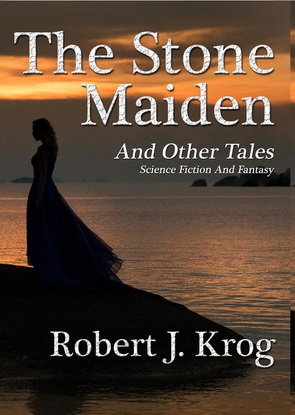 Click on this picture to find this lovely collection on Amazon and several of Robert Krog's other books. Click on this picture to find this lovely collection on Amazon and several of Robert Krog's other books. Robert Krog is both an author and editor. I’ll share more from him as an editor next week, but today he’ll wear his author hat. “My first work, The Stone Maiden and Other Tales, was first published in 2010. I started getting short fiction into anthologies the year after that and found myself reading them more and more. I think I have stories out in thirteen different anthologies at present, with four or five more coming out in the next few months or so, and it has been a great experience.” Krog is also going to be published in Tomato Slices with me and is both editor and contributor to A Tall Ship, a Star, and Plunder, which he claims is his favorite of the collections featuring his work. ( Find more of his stories on his website : http://krogfiction.yolasite.com/) Why does he write short stories? “Short stories are supposed to explore a single idea. Novels are supposed to go further, deeper, and broader. I like to read and write both, though I do not yet have a published novel. Novels are a lot more work for man with a full time job, a wife, and three young children. I’m nearly there though. The level of satisfaction that goes with finishing a novel will be, I expect, much greater than that of finishing a short story for the first time. Mind you, I have no intention of giving up on short stories. Is there a benefit to writing and publishing short stories? “I advise writers to submit short stories for various reasons. It’s easier to get a short story out than it is to get a novel out. A reader who likes a short story is likely to look for more work by the same author, such as a novel. Having short fiction out may be a way to reach an audience otherwise inaccessible. Writing short fiction is an exercise in discipline. Keeping one’s story to a certain word count may mean that the story will have little fluff in it. It can be an exercise in discipline.” Overall what I am getting from these authors and my own experience is that writing short stories is great exercise for improving your craft as a writer. On the career end, however, it is a way to earn some publishing credits and name recognition. There are plenty of paying markets still, although the magazine market has shrunk a lot in recent years. And hey, if you’re writing short stories just for fun, make sure you keep them. You never know when they’ll fit the theme of a publisher’s call. The books mentioned by Katy Jones, Frank Luke, and Robert Krog are available at Amazon. Click on the pictures to find them. Next week, I’ll have Robert Krog back to share about being an editor of short story collections, along with Nancy Schumaker from Melange Books, and Kay Iscah of Amoeba Ink. Please feel free to leave a comment below about your experience with short stories. I'd love to know about it. Oh, and one last thing! Second Chance for Love is currently part of a Goodreads giveaway (through August 5th). Make sure you sign up! 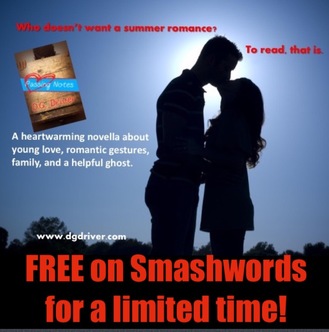 It went free on Smashwords, Nook and iTunes long before it was free on Amazon, so this is the flier I made to send people there while I waited for Amazon to get on board. It went free on Smashwords, Nook and iTunes long before it was free on Amazon, so this is the flier I made to send people there while I waited for Amazon to get on board. This summer, the lovely women who run Fire and Ice Young Adult Books and I decided to try a little experiment with my book Passing Notes by lowering the price (again) and then making it free for a short while. Because I have a weird desire to write frankly about all the successes and foibles of my writing career on this blog, I want to share with you how that experiment went. To begin with, I am part of a group on Facebook full of Indie authors (mostly self-published) who are very open about sharing their promotion ideas. Overwhelmingly, they (and pretty much every indie-pub’d author I’ve met) do very well with having the first book of their series permanently free. It hooks in readers, and those readers go on to purchase the rest of the books. Some try offering their work free for a short while and then go back up to 99 cents for a bit before returning to full price, which is never more than $5.00. I have three YA books out. Two are part of a series and the third is a novella. I asked the group and lots of other people in the biz if it would be better to make Cry of the Sea (the first of the Juniper Sawfeather Novels) free with the hopes of getting people interested in purchasing Whisper of the Woods, the sequel, or would it be better to give away my little novella, Passing Notes, as a sample of my writing and simply discount the other books for a bit. Overwhelmingly, the response was to give Passing Notes away. People would love it and go on to purchase my other work. 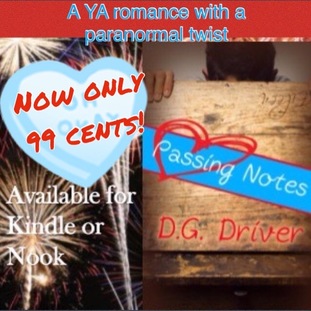 I am not self-published, though, so I can’t change the prices of my books willy-nilly. I have to ask for that favor, knowing that my publishers have to be willing to not make any money either. Well, Passing Notes hasn’t exactly been flying off the digital book shelves, so we agreed to try it. At the very least, it would get the book some attention. First, we lowered the price at Kindle to 99 cents and free everywhere else. Then we waited for Amazon to get on board and “price match” to free, because they don’t get any money for free books either. For that first half month, at the lowered price (literally $1.00 lower than it was before), it sold 5 copies at Amazon. *I will point out here that I don’t have data as to how many units were downloaded from Smashwords, Nook, or iTunes during this time. 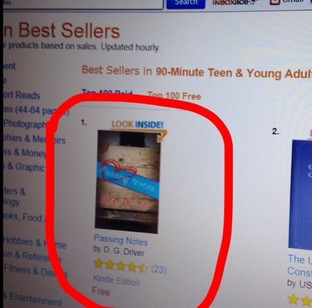 Finally, mid-June, Passing Notes went free. It immediately rose to the top ten of its category “90-minute Young Adult Fiction – Free”. I had a couple free and two paid promotions that weekend. (And I was soooooooo thankful the price dropped in time. I was very anxious about it, actually.) The promotions really helped, especially the one from Fussy Librarian on June 18th. The couple days that followed had my biggest downloads of over 300 units in a day and brought Passing Notes up to #1 Bestseller in its category. It stayed within the top 12 for the remainder of the time it was free, but it never got higher than 5 again even with the extra promos I did with smaller companies. 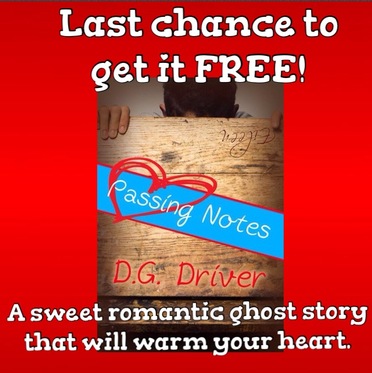 This was actually my most successful self-made promo ad. It got a lot of RTs on Twitter and comments elsewhere. This was actually my most successful self-made promo ad. It got a lot of RTs on Twitter and comments elsewhere. I had to promote the deal regularly on my own social media pages. So I didn’t get too boring, I made a lot of different fliers about it. You’re seeing some of them in this post. Come July, it was time to start charging again. I did a last chance flier that I posted everywhere, and I got a lot of last minute hits. Like before, it took Amazon a minute to change the price. We only went back up to 99 cents, and we probably should keep it there. The experiment was to find out a couple things: 1. If the book was free, would people want it? The answer was yes. On Kindle alone we “sold” 1,095 copies of Passing Notes over that 3-week period. It’s not a runaway success, but I’m happy with it. 2. If the book was free, would it lead to sales of my other books? The answer was no. I didn’t see any uptick at all in sales of Cry of the Sea, Whisper of the Woods, or the new romance anthology Second Chance for Love, even though all of those books have been discounted all summer. 3. If the book was free, would I get more reviews? The answer was a marginal yes. I did get three new reviews on Amazon and two on Goodreads. I expect I’ll receive more as people get around to reading it. I got about 50 or more people added to the story’s Goodreads “to-read” list. On top of that, I had a few nice mentions on Facebook from people telling me that they liked it or recommended it for someone they knew. 4. If the book was free for a short while, would the momentum continue after the book was not free anymore but only cost a dollar? The answer is no. “Free” is the allure. Some people clearly only want free books, and they are not interested in paying for them. I think this is also why this giveaway didn’t lead to sales of my other titles. The vast majority of people who downloaded Passing Notes were probably not interested in paying for any books – ever. If you don’t mind reading indie and self-published books, you can read very happily for a very long time without ever having to pay a dime. It doesn’t bother me. It’s not unlike people who only get their books from libraries. The only difference for authors is that at least that copy was sold to that library at one point. 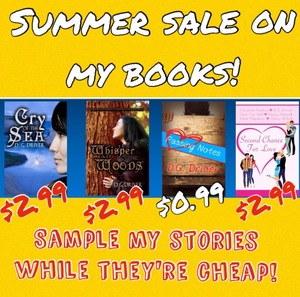 Click here to get to my Amazon page. Click here to get to my Amazon page. What to do now? Well, my publisher and I talked about some new ideas for Passing Notes. Perhaps a change to the cover design? Perhaps a revision to make the story longer? I like it the way it is, and my reviewers do too, so this is a tough one for me. My other idea is to add a couple more paranormal novellas to make it a bigger book. It’s an on-going trial and error to see what might catch the eyes of potential readers. In the meantime, all of my books published under the Melange Books umbrella are discounted for the summer. I don’t know that the sale will last into August, so if you are at all interested in reading any of my books for cheap, this is the time. And if all of these fliers about Passing Notes didn’t tell you enough about the book, you can learn more, read an excerpt, see some reviews, and find buy links here: www.dgdriver.com/passing-notes.html I welcome your comments, your ideas, and your stories below. Last July I posted three articles called "Shy Girl at the Con (parts 1, 2,and 3)" about my experiences at three back-to-back events. Two of them were speculative fiction conventions where I was an invited speaker, and the third was a Young Adult writing conference where I was simply an attendee. They weren't the most awesome experiences for me, and I wrote that I was unsure whether I would go back again. Well, a year passed and I decided to brave two of them again and pass on one. I let Libertycon in Chattanooga go because, while it was a very well organized event, it actually cost money to attend (as a charity donation) not to mention gas to drive back and forth or a hotel if I wanted to stay down there. Being that I didn't sell a single book last year, I didn't think it was worth it. I didn't sell anything at Hypericon last year either, the other spec fic con I "spoke" at. I was really unhappy with the way I was treated at that event and didn't plan on attending this year. They put my name on the list and website before I told them no. When I approached the woman in charge about it, she promised me it would be at a better venue and better organized. I agreed to participate, but I limited my availability to only Saturday. At first it was because I was planning to do a local musical, but I wound up not trying out for it (because I was too busy writing). I never told her I was available on Friday or Sunday (Father's Day), and therefore she put me on only one panel. It was still organized at the last minute, but at least this year it was a subject that applied to me. I guested with 5 other authors about writing short fiction. Having had 3 short stories in anthologies recently and about to work on a new one, I was happy to talk about this subject. The panel was a lot of fun even if only three people were in the audience listening. Author Robert Krog, who edited A Tall Ship, A Star, and Plunder (the pirate anthology featuring my story "The Jamaican Dragon") was on the panel too, and it was very nice to meet him. Like last year, I was told I would have a guest author signing time, and it was supposed to be right after the panel. The other authors had papers with their assigned times. I did not. So, I mosied over to the signing tables, found an empty spot and set up for an hour anyway. Sadly, the guest author signing tables were in the lobby of the hotel, far from the ballrooms where the convention was being held. So none of us got any traffic at all. I sold one book to the very nice author next to me who had the most amazing flaming red and magenta hair. After I was done with my fake signing, I left. I saw absolutely no reason to stay at the very quiet convention where it appeared the only people there were the speakers. There were some cosplay people milling about, and I suspected they were just waiting for the contests later in the day. Big waste of time for me, and I definitely won't be back next year. 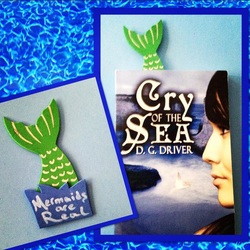 The bookmarks I made. I still have a bunch, so if you'd like one, email me and we'll discuss how I can get one to you. The bookmarks I made. I still have a bunch, so if you'd like one, email me and we'll discuss how I can get one to you. Four days later I was back at the same hotel for Utopia, the YA conference. Last year I went as an attendee and went to the panel discussions. I was a little disillusioned by it all. Over the year, though, I stayed connected to the social page for the event on Facebook, and it got me all hyped up about going again. I plopped down the money and bought myself an exhibitor table. It was way too much to spend, and I knew I wouldn't get it back. Still, I figured I'd sell a few books and still have access to the panels and keynote speeches if I wanted to attend them. I tried to be active on the social media about the event, liking and commenting on posts, occasionally posting something myself, and following people on Twitter and stuff. I tried dying my hair blue so I'd look more fun and approachable, but it didn't show up. I made a vow to be sociable and talk to people, maybe even start conversations. I spent evenings making mermaid tail bookmarks by hand to be my memorable (and hopefully keepable) swag for the event, thinking that handing those out to people would help start interaction. All of that helped. People seemed mildly familiar with my name and face. I smiled the whole time and said hi to everyone. The bookmarks were a hit, and they enticed a few people to come close to the table. (Most people kind of walk down the center of the aisles, trying hard not to engage so they won’t feel like they have to buy). The two authors I really like that didn't recognize me last year, hugged me and chatted with me this year. Brenda Hiatt even remembered the name of one of my books without being prompted. That was cool. A couple bloggers that have reviewed my books came and said hello. One of them is Doris Orman (of Dowie's Place), who is a champion of Utopia and helped make me feel welcomed by saying hi frequently, posting this picture of her with me, and commenting on my posts. I was kind of thrilled to see a picture of me in the morning slide show on Friday morning. 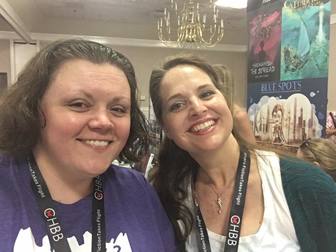 Doris Orman and me at Utopia. Doris Orman and me at Utopia. Ultimately, though, my impressions of the event from last year remained the same. The bulk of the event is not about the exhibition room or the panels about writing and selling books. What the attendees are there for are the parties in the evenings and the lunches out. The place emptied out completely from 1:00-2:00 both days as everyone, including vendors, went to lunch. One author across the way from us was never at her table - she was out socializing the whole time. All the social media was about the karaoke event, the games, the award show and the dance party. If you weren't there for the social part of the event, there really wasn't much point in going. I live in Nashville, and although I am a singer I don't even go to Karaoke with my friends here in town (and I have a dear friend who runs a regular Karaoke show). As an extreme introvert and homebody, I couldn't drum up the energy or motivation to go back downtown Saturday evening to the award show or the dance afterward and didn't know exactly how I'd explain going to my husband. "Hey honey, I want to go to a party with a bunch of women I don't know. Whatcha think?" He'd think I'd been replaced by an alien. I sold 2 copies of Cry of the Sea. That's it. The lady next to me on the right sold several copies of her picture book, which was unexpected for a YA event. The ladies to the left of me (who were possibly shy-er than me) sold about 10 of their book, which impressed me for a brand new self-published title that they confessed didn’t even have a genre (nor did that have any swag or fancy display). I didn't get too bummed out about it, because I didn't see anyone except the well-known authors sell lots of books. It also appeared that the romance/sexier novels were selling the best - especially the ones where hunky cover models came for photo opps. As there weren't a lot of actual teenagers there, that kind of made sense. 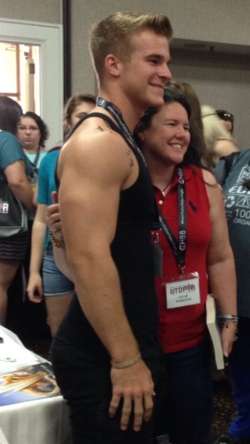 This guy was the cover model on a series of books two tables down from me. That author had a huge street team of ladies in matching pink shirts. Tons of swag. She sold books hand over fist. It was kind of crazy. I snapped this picture to send to my daughter (whom I should have brought with me) and make her drool a little. This guy was the cover model on a series of books two tables down from me. That author had a huge street team of ladies in matching pink shirts. Tons of swag. She sold books hand over fist. It was kind of crazy. I snapped this picture to send to my daughter (whom I should have brought with me) and make her drool a little. And that was the thing that kind of frustrated me the most. I had been led to understand that the exhibition room was open to the public, but I didn't see any non-conference people there. Plus, what teenager can make it to downtown Nashville on a Thursday or Friday morning? Their parents work during that time. I thought there should have been one more day of bookselling on Saturday. I mean, the Barnes and Noble room was open on Saturday. I also, being local, never saw or heard one single bit of advertising to the general public that this event was going on. Frankly, it's really hard to sell books to a crowd full of authors who are also there to sell books. I didn't buy any. I'd already spent enough just to be there. In the end, the only thing having the table was good for was that it forced me to talk to people, when as an attendee the year before I didn’t talk to anyone at all. A couple of the panels and keynote speeches I went to were good. One was odd, simply because it was done by an erotic romance novelist. While I don't have a problem with erotic romance novelists, I did wonder why a keynote address for a Young Adult conference would be someone who doesn't write Young Adult. What made the event worth it was the keynote panel on Saturday morning. A group of best-selling authors answered questions and spoke about their personal struggles with self-esteem, highs and lows of being authors, writing time conflicts, and other personal issues related to writing. I’d never been to a session like that before, and it made me feel less broken and daunted by this whole writing gig to know that even the successful authors feel doubt , fear, and dismay. While I didn’t go home from this event with the same "high" other Utopians expressed in their posts, I did feel a little more connected to the writing world than before. We'll see where life takes me over the next year to determine whether or not I'll drum up the courage for this event again. 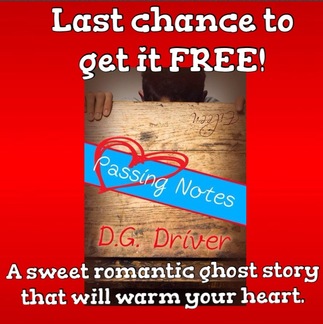 Feel free to leave a comment if you like. Next time I'll be writing about my little experiment of putting my novella Passing Notes free for the month of June. So please come back. (Last I checked, it's still free, but my publisher has set it to go back to 99 cents. It could happen any time, so head over to Kindle now and get your copy.) |
D. G. DriverAward-winning author of books for teen and tween readers. Learn more about her and her writing at www.dgdriver.com Archives
July 2024
Categories
All
|
Author D. G. Driver's
Write and Rewrite Blog
“There are no bad stories, just ones that haven’t found their right words yet.”
A blog mostly about the process of revision with occasional guest posts, book reviews, and posts related to my books.
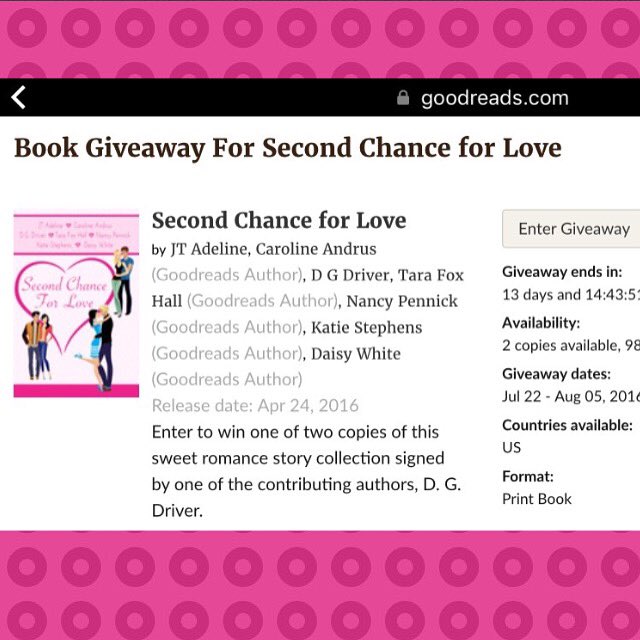
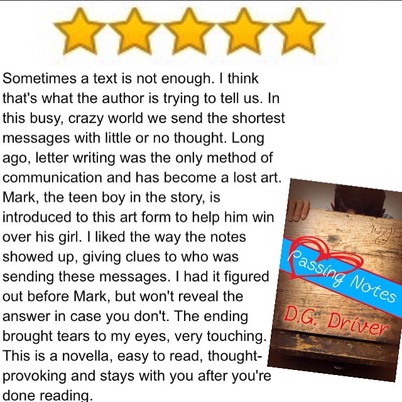
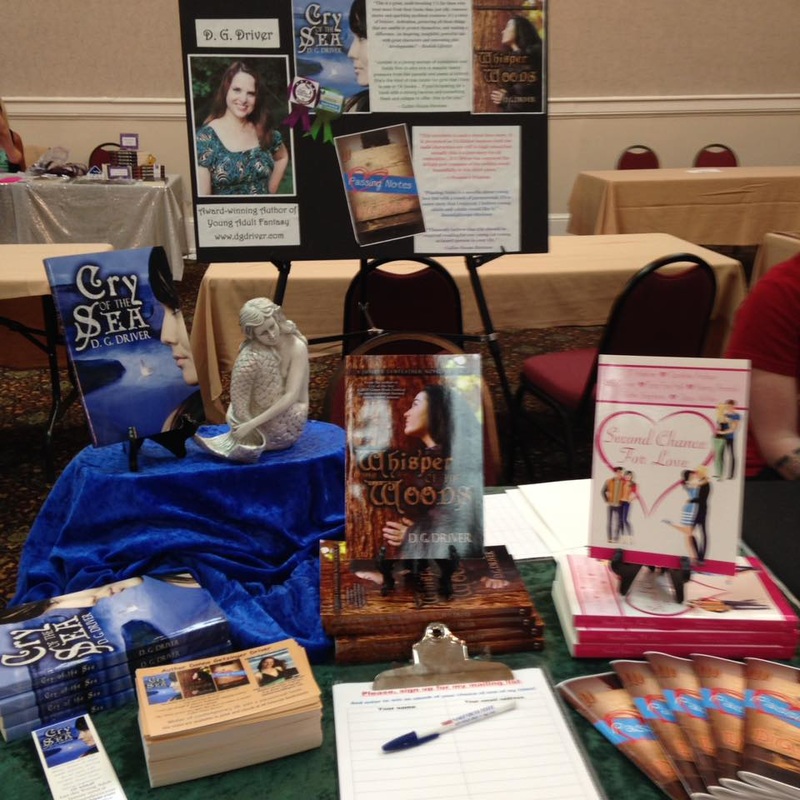
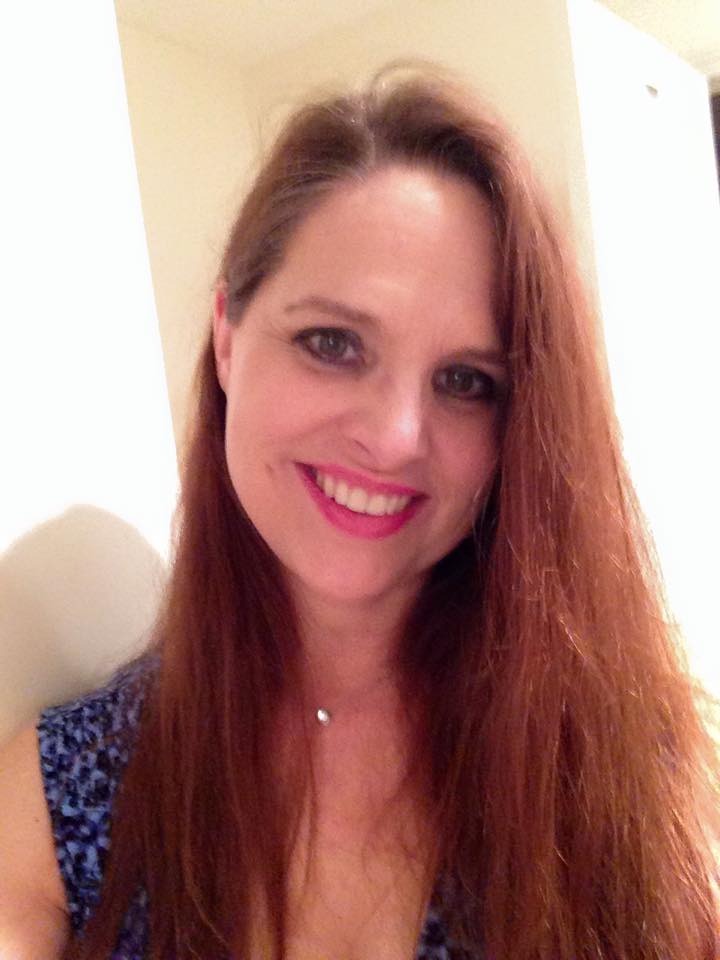
 RSS Feed
RSS Feed